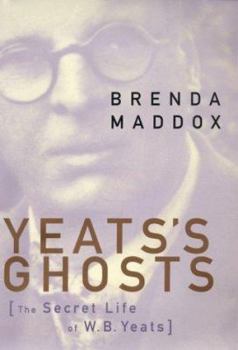Yeat's Ghosts: The Secret Life of W.B. Yeats
Select Format
Select Condition 
Book Overview
Brenda Maddox, the award-winning, world-renowned biographer, looks at one of the towering literary figures of the twentieth century, W.B. Yeats, through the lens of the Automatic Script, the trancelike communication with supposed spirits that he and his much younger wife, George, conducted during the early years of their marriage. The full transcript of this intense occult adventure was not available until 1992 and remains virtually untouched by biographers. The vision papers covered more than 3,600 pages of writing, symbols and obsure diagrams penned by Yeats's wife during their 450 sitting of automatic writing. Maddox finds the scripts to have been a ghostly form of family planning--as well as one of the most ingenious ploys ever used by a wife to take her husband's mind off another woman. This revealing biography flashed back to Yeats's early years (1865-1900), to the least-examined important woman in his life: his silent, dreamy mother, whose Irish ghost stories steered him into his occultist path. The book then returns to the mature Yeats, to analyze, with new information and a sharp feminine perspective, his public career in Ireland, his sexual rejuvenation operation and his obsession with several younger women--and related them all the triumph of his late poetry. While much has been written about Yeats, until now no one has managed to convey the humane nature of the man and get behind the "smiling public man" to expose the intense privacy and passions of a powerful and often misunderstood artist.
Format:Hardcover
Language:English
ISBN:0060174943
ISBN13:9780060174941
Release Date:September 1999
Publisher:Harper
Length:496 Pages
Weight:2.10 lbs.
Dimensions:9.3" x 1.5" x 6.1"
Customer Reviews
2 ratings
Cast a Cold Eye
Published by Thriftbooks.com User , 22 years ago
Look, Brenda Maddox is a journalist not a scholar. She has little to say about the poems and her sources are nothing new. But she writes a lively prose with a deft eye for the human angle in describing the parade of remarkable women who passed through Yeats's later life. I don't think she's out to replace the more detailed biographies other reviewers mention so much as add color and detail to the standard portrait of the 'smiling public man.' The book's centerpiece is the early years of Yeats's marriage to his wife George, a cultivated woman twenty-seven years his junior who turned what looked to be a marriage of convenience into a source of great poetic inspiration. George began channeling spirits on their honeymoon which, over the next two years, revealed to Yeats an entire philosophy of history and the soul's fate after death while also dictating how an older, indifferent lover ought to treat a young new wife. Maddox leaves the question of the Script's authenticity open, pointing out on the one hand how well it suited George's purposes and on the other how sincerely she shared Yeats's occult beliefs. Halfway through the book though, after a short, out of place chapter on Yeats's mother, she leaves George behind to concentrate on the eccentricities of Yeats's later years. Yeats had a capacity for staying 'forever young' that led to some odd connections; he involved himself, especially after the Steinach operation, with a cast of dubious individuals who took him away from the unwanted responsibilities of home and family. I don't think Maddox is trying to pull Yeats off a pedestal--she clearly believes the poems he wrote in these years are great. She's also fair-minded in dealing with Yeats's Fascist sympathies, his late passion for eugenics and the bad rap he's gotten from feminists. But showing how much care and indulgence his work required from others, especially the women he chose to attend to his needs, reminds you that greatness is often a collaborative effort. Giving credit where credit is due for Yeats's late achievement, especially in the case of his long-suffering wife George, takes nothing away from his achievement. Just the opposite; I admired the poetry all the more knowing the personal hopes and (sometimes) blindnesses it grew out of. A fun, instructive read.
A Thoroughly Enjoyable Read
Published by Thriftbooks.com User , 26 years ago
While Ms. Maddox's book is not scholarly, nor is it sensational; she walks a very careful line between the reverential respect for the Great Nobel Laureate, and an irreverent and open look at his private life, whether in the company of ghosts, or lovely young women... One imagines the author winking to her readers now and again, but the portrait she presents is very human, and quite simply fascinating. I couldn't put it down. And it was a marvelous way to reread the poetry, in context, as it were.






